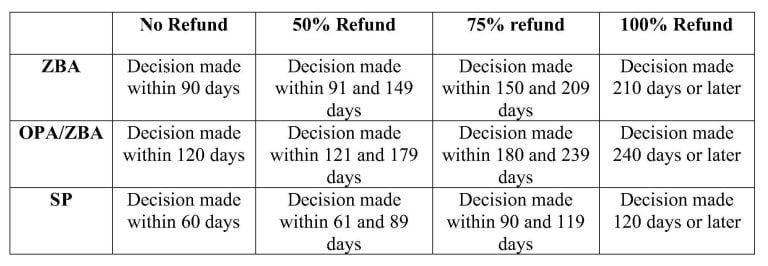The Housing Affordability Task Force released a report on February 8, 2022, that provides 55 recommendations on how to fix housing affordability.
On March 30, 2022, and as a first step partially in response to the Task Force’s recommendations, the Province released Bill 109: the More Homes for Everyone Act, 2022. The Province describes Bill 109 as follows:
We are introducing More Home to Everyone, that proposes targeted policies for the immediate term that make housing fairer for hard-working Ontarians and make it faster to build the homes that families need and deserve.
Bill 109 is at second reading before the legislature and is subject to change before it may become law. The Province posted Bill 109 and associated documents on Ontario’s Regulatory Registry and is accepting public input on it until April 29, 2022. Further details are available at this link.
Bill 109 proposes to amend the following legislation: the Planning Act, the City of Toronto Act, 2006, the Development Charges Act, 1997, the New Homes Construction Licensing Act, 2017, and the Ontario New Home Warranties Plan Act. If Bill 109 is passed in its current form, it will result is several significant changes to land use planning in Ontario.
Our analysis is focused on the key proposed changes to the Planning Act, and the City of Toronto Act, 2006. The proposed changes to the Development Charges Act are limited and relate to how annual financial statements for developments charges and reserve funds are to be made available to the public.
Here is a summary of how Bill 109 proposes to change land use planning in Ontario together with our preliminary comments:
Proposed Refund of Application Fees
- Some or all of the application fees are to be refunded if a rezoning application (“ZBA”), a combined official plan amendment and rezoning application (“OPA/ZBA”), or a site plan application (“SPA”) is received after the date the amendments in Bill 109 comes into force, and no decision is made on that application within the statutory timeline. The table below summarizes the proposed rules.
 * Decision timelines are from the date of complete application
* Decision timelines are from the date of complete application
- Applications fees are significant in certain municipalities, and it remains to be seen how this proposed change might impact the timing of application processing. It might encourage municipalities to make quicker decisions. However, it might also encourage municipalities to decide on an application prematurely, which might result in more refusal appeals to the Ontario Land Tribunal (“OLT”). It may also make applications more difficult to be “deemed complete” to get the clock running in the first place.
Proposed Increased Powers for the Minister
- The Minister is authorized to suspend the time period for filing a non-decision appeal of an official plan or official plan amendment where the Minister is the approval authority. The suspension of the timeline does not preclude the Minister from making a decision. Presently, a non-decision appeal can be filed within 120 days after the official plan or official plan amendment is received by the Minister.
- If the Minister is the approval authority with respect to an official plan it may refer all or part of that official plan to the OLT. The referral can be for a recommendation or a decision on whether the official plan, or part of it, should be approved, approved with modification, or refused.
- A proposed new process for the municipality to request the Minister to make a zoning order, which the Province labels the Community Infrastructure and Housing Accelerator. Draft guidelines on its proposed use have also been released for comment and the guidelines need to be in effect for the tool to be available. The Community Infrastructure and Housing Accelerator cannot be used in the Greenbelt Area. The Minister’s existing zoning order powers remain unchanged, and so the Minister can continue to make Minister zoning orders without a request from the municipality.
- The Minister is proposed to have the power to make regulations regarding:
- the type of securities that can be used to secure municipal requirements as part of the approval process.
- reporting requirements for municipalities and planning boards related to planning matters, including what must be included in those reports, who the reports are to be provided to, the frequency of the reports and the format in which the reports are to be provided. This may become a tool for the Minister to monitor municipal planning approval processes.
Proposed Expansion of Appeal Rights to the Minister’s Decision on Official Plan Amendments
- A new appeal right is proposed with respect to an official plan amendment where the Minister is the approval authority. An appeal of the Minister’s decision to the OLT can be made provided the official plan amendment is not:
- an amendment that has been referred by the Minister to the OLT for a recommendation; and
- a revision that is adopted in accordance with section 26 of the Planning Act.
- A new appeal right is proposed with respect to an official plan amendment where the Minister is the approval authority. An appeal of the Minister’s decision to the OLT can be made provided the official plan amendment is not:
Presently, there is no appeal right in respect of a Minister’s decision on an official plan amendment where the Minister is the approval authority.
Proposed Amendments to Site Plan Control
- Municipalities must delegate authority to approve site plan applications to a designated authorized person (officer, employee, or agent of the municipality). At present, municipal council may, but is not obligated to, delegate its authority to approve site plan applications.
- A new complete application process for site plan applications is proposed. This process is like the complete application process that applies to official plan amendment applications and zoning bylaw amendment applications.
- The timeline to appeal a site plan application for non-decision is increased from 30 days to 60 days.
Proposed Amendments to Subdivision Control
- The Minister may prescribe matters that are not permitted to be imposed as conditions to subdivision approval. What these matters are have not yet been disclosed.
- An approval authority may deem a subdivision application that lapsed within the past five (5) years to not have lapsed provided that such subdivision application had not previously been deemed to not have lapsed.
New Rules regarding Community Benefit Charge By-laws and Parkland Contribution
- If a municipality has a community benefit charge by-law in effect, it will be required to review that by-law to determine whether there is any need for revision. If the municipality does not pass a resolution declaring whether a revision to the by-law is needed, within 5 years of the by-law first being passed, and periodically each five (5) year period thereafter, the community benefit charge by-law expires.
- If development lands are designated a transit-oriented community under the Transit-Oriented Communities Act, 2020 (“Transit-Oriented Community”), the development lands will be subject to a maximum parkland contribution of:
- 10 percent of the lands or the value of the lands if the lands are five hectares or less in area; or
- 15 percent of the lands or value of the lands if the lands are greater than five hectares in area
- The Minister of Infrastructure may, by order, identify lands within a Transit-Oriented Community as encumbered. The identification of encumbered lands is subject to specified criteria. Should a proposed development include encumbered lands, the encumbered lands are required to be conveyed to the local municipality for park or other public recreational purposes. The conveyance of the land is to be counted towards the parkland contribution requirement associated with the proposed development.
We will continue to monitor Bill 109 and provide periodic updates. If you have any questions regarding Bill 109, or any other land use planning matter, please do not hesitate to contact us.
The information and comments herein are for the general information of the reader and are not intended as advice or opinion to be relied upon in relation to any particular circumstances. For particular application of the law to specific situations, the reader should seek professional advice.

